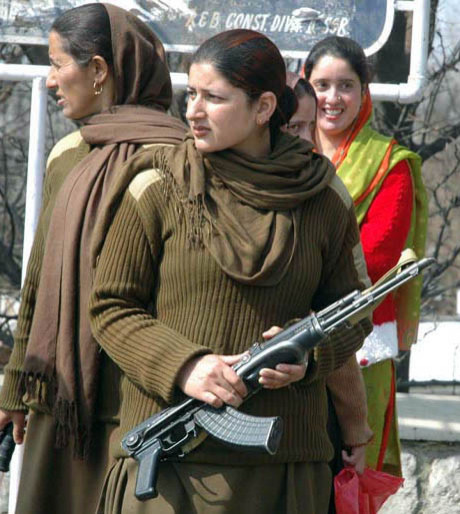No Country For Women: Pakistani Females Face Extraordinary Obstacles As Police Officers

Pakistan is one of the world’s most dangerous places to be a woman – from poor education and access to health care to the ever-present dangers of forced marriage, rape and murder by men (even relatives), life in this impoverished South Asian nation offers many hardships for the fairer sex.
Not surprisingly, those few, hardy women who join the police force in Pakistan face a mountain of obstacles. Reuters reported on Shazadi Gillani, the highest-ranking female police official in the conservative northwestern Khyber Pakhtunkhwa province, where women account for fewer than 1 percent of the province’s 60,000 police officers. (Individual-land Pakistan, a research consultancy and advocacy group, said that in the whole of the country there are some 400,000 police – and only 3,700 are women -- despite a 5 percent quota system established by the state for female police).
On the force for almost 20 years, Gillani initially had to overcome her father and brother’s objections. “They said police disrespected women,” she said. “I had a lot of opposition.” Due to the heavy presence of Taliban in the province, she has to wear a burqa when she travels on duty.
In recent years, some small steps have been taken to recruit more women into the police force – for example, the German government has financed the construction of all-women dormitories at police academies. In 1994, the Pakistani government opened two female-only police stations in the province. There are now at least 18 such facilities across the country.
Officials hope that the (still meager) presence of female police officers will enable more women to report crimes committed against them -- since they are largely forbidden to speaking to men who are not related to them.
Even within the police force, women have to fight against the chauvinism of their male colleagues. In Peshawar, Rozia Altaf, a 16-year veteran of the force, had to wait six years before her application for police training was even accepted. She now heads the all-women station in the city. “We were neglected,” she said. “But now I make sure my junior officers get training and promotions on time.”
But too few members of the public take female cops seriously, and the all-women stations are far less busy than their all-male counterparts. Making things worse, many male colleagues do not regard women policemen as equal or even necessary. “If people see women police doing their jobs well, they will change their minds,” Gillani countered. “Change is a challenge for all of society, not just police.”
United Press International reported that Khyber Pakhtunkhwa provincial officials formed four police desks staffed by women specifically to deal with complaints from women about acts of abuse or violence. Local officials have also established two legal centers in hospitals to facilitate the investigation and prosecution of sexual assault cases. "After the consultation with a female doctor, we will examine the physical injuries of the victims, if any, to proceed to a legal process without any delay," Khatoon Bibi, a female officer at Swat Valley's Saidu Group Hospital, told UPI.
Saima Anwar, the first woman lawyer in the region, explained that if female victims reported their cases to lady police officers, “they will be able to share all the information without any shyness. This is important for the legal procedure, if we want to have justice.”
The United States Institute of Peace noted that beyond the chauvinism and rejection that women police officers in Pakistan encounter from their male colleagues and members of the public, they must also contend with poor training, long work hours, the dangers of terrorism (on top of "ordinary" criminals) as well as the distrust of a wide swath of Pakistanis who regard police in general as corrupt and largely ineffective.
“They [Pakistani police] are also prime targets of violent and often deadly attacks perpetrated by extremist elements,” USIP said. “In addition to the broader challenges of policing in Pakistan, female officers face obstacles related to the shifting cultural roles of women in society. … Young women are discouraged or even forbidden by their male relatives from applying for the force. Low levels of female education make finding qualified candidates challenging.”
© Copyright IBTimes 2024. All rights reserved.





















